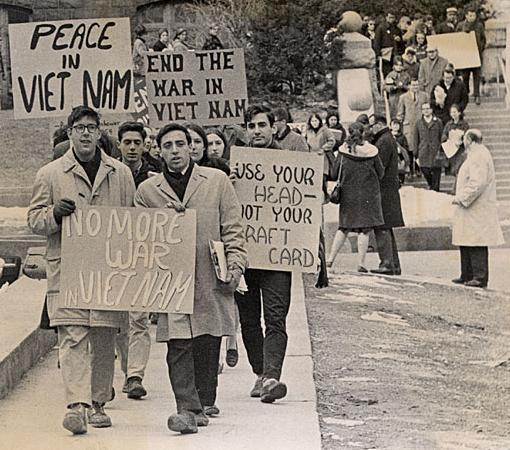1968: Tragedy and War: Students' Increasing Activism and Demonstrations

1968 was a momentous year full of triumphs and tragedies, including social unrest and activism covering both international as well as domestic issues. The Tet Offensive in January was one of the bloodiest battles for Americans during the Vietnam War and it motivated more American citizens back home to further withdraw their support of the war. Additionally, the Civil Rights Movement and the progress that it was making on the homefront suffered shocking setbacks with the assassinations of Martin Luther King, Jr. and Robert F. Kennedy.
Given this tumultuous context within which students were living, it was important to gauge their activism surrounding these issues. Specifically, the following questions, only asked in 1968, were asked to assess the level of student activism during their last year in high school:
Below is a general list of things that students sometimes do. Indicate which of these things you did during the past year in school.
• Participated in a demonstration against the war in Vietnam
• Participated in a demonstration against racial discrimination
• Participated in a demonstration against some administrative policy of my school
Even though these social and political issues were unfolding as these students were finishing high school, few of them actually participated in demonstrations. Only 4.6% of all freshmen indicated that they had “frequently” or “occasionally” participated in a demonstration against the war in Vietnam. Similarly, only 7% responded that they had done so in response to racial discrimination. However, significantly more students participated in demonstrations in a more local context against some administrative policy at their schools (16.1%). While men and women participated in demonstrations against broader issues at similar rates (Vietnam: 4.9% of men, 4.2% of women; racial discrimination: 7% of men, 7.1% of women), more men played an active role in demonstrating against local issues, such as the administrative policies of their school (17.5% of men, 14.3% of women). While the events of 1968 were significant, students were not yet actively participating in these movements.
Did you know…
49.8% of all entering freshmen indicated that they “frequently” or “occasionally” arranged a date for another student during their last year in high school.
